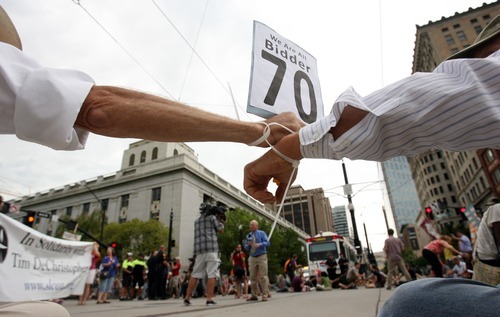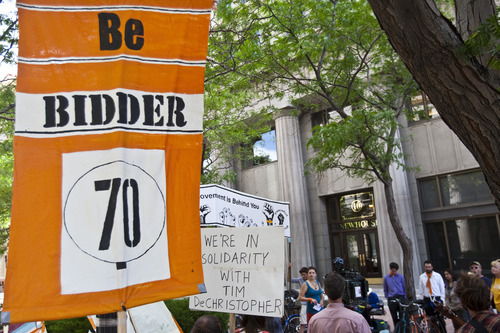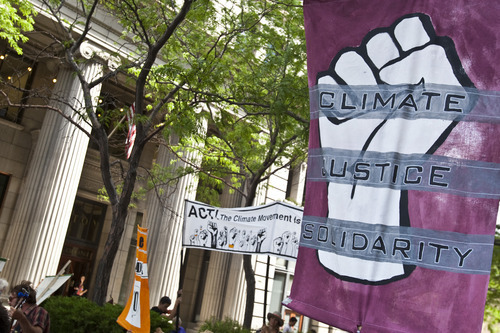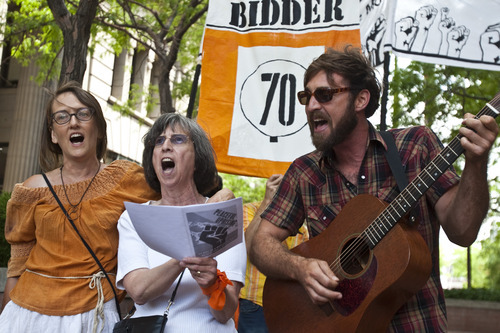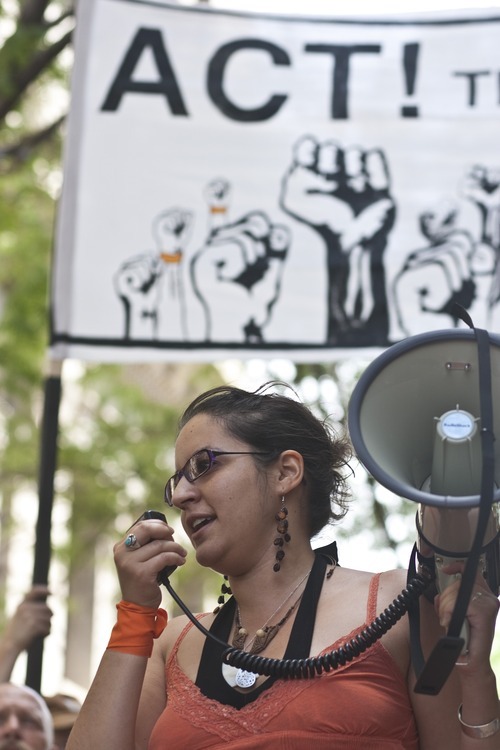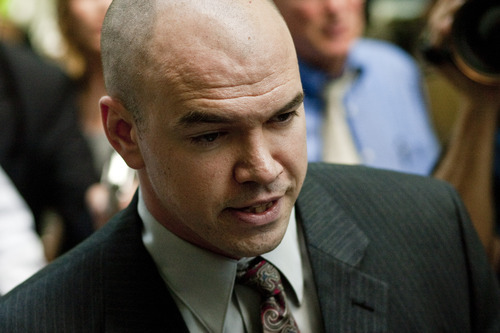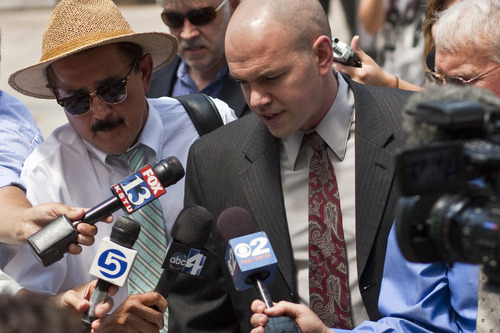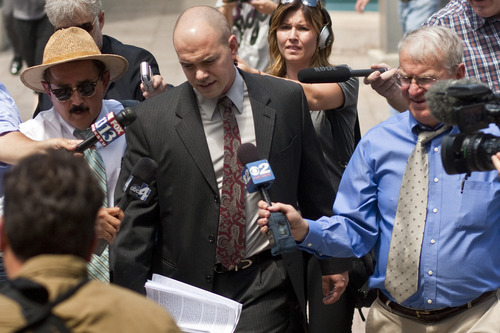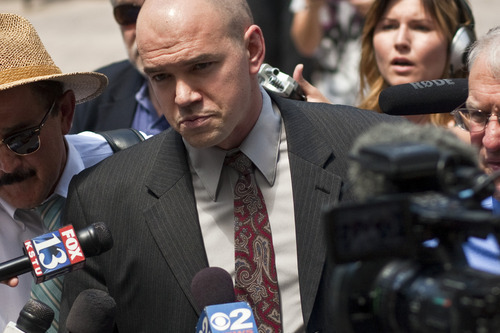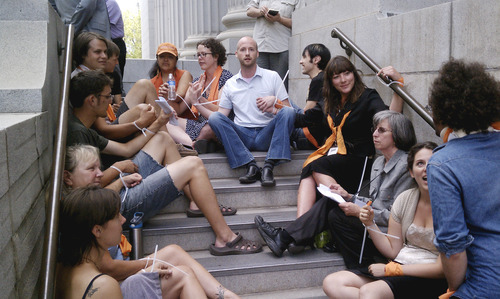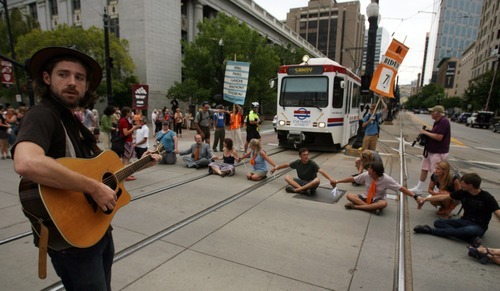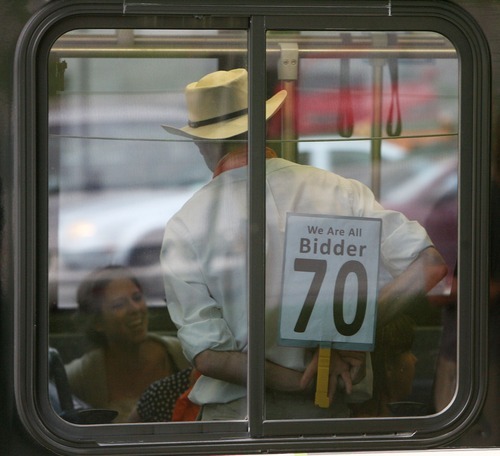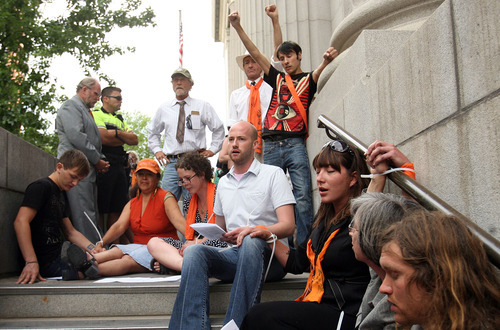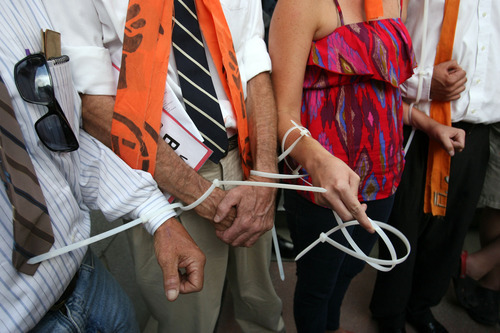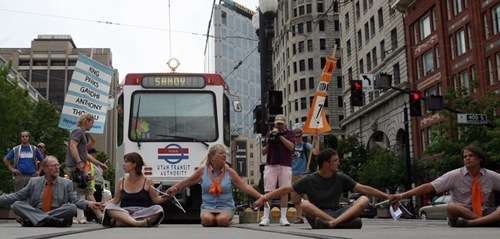This is an archived article that was published on sltrib.com in 2011, and information in the article may be outdated. It is provided only for personal research purposes and may not be reprinted.
Tim DeChristopher's mouth — and not just his 2008 disruption of a federal oil and gas lease auction — landed him behind bars Tuesday, a judge said as he slapped the activist with a two-year prison term.
The incarceration of the burgeoning folk hero among climate activists set off anger inside the courtroom and a concerted protest outside that ended in more than two dozen arrests.
U.S. District Judge Dee Benson pointed to DeChristopher's continued defiance and frequent assertions to reporters that civil disobedience is justified in fighting climate change. He mentioned DeChristopher's speech after his March conviction, in which the activist implored others to buck the system.
If not for that "continuing trail of statements," Benson said, DeChristopher might not have faced prosecution, let alone prison.
"The offense itself, with all apologies to people actually in the auction itself, wasn't that bad," Benson said.
The judge quickly dismissed a defense request for DeChristopher to surrender himself later, and instead ordered him immediately into U.S. marshals' custody. DeChristopher was sent to Davis County Jail, where he will await a prison assignment. Benson also imposed a $10,000 fine.
After the judge left for his chambers, one DeChristopher supporter shouted, "This court is broken. … Is this a corporate court or our court?"
"Our court!" responded a small crowd of supporters.
"I think this judge is a spineless bastard," another woman yelled before the crowd started singing protest songs on its way out. Outside, the demonstration became more agitated. Police arrested 26 people after DeChristopher backers blocked a TRAX train and stopped traffic during the rush-hour commute.
The sentence comes after DeChristopher, now 29, disrupted a December 2008 auction at the U.S. Bureau of Land Management's Salt Lake City office. The Bush administration was coming to an end, and environmentalists viewed the auction as a rush to maximize energy development without proper reviews.
A federal judge later issued a restraining order in a lawsuit to that effect, and the Obama administration suspended the leases.
DeChristopher signed in as a bidder that day. At first, he drove up bid prices. But after winning one — by accident, he said at trial — he decided to try to win the rest. From there he won 14 eastern Utah leases with a total price tag of $1.8 million and no money to cover them. Suspicious BLM officials suspended the auction.
It was an act of civil disobedience that, on Tuesday, had defense attorney Ron Yengich comparing to those surrounding Rosa Parks' and Mohandas Gandhi's celebrated stands against racism and oppression, and even Mormon prophet Brigham Young's defiance of government-sanctioned persecution.
But it led Benson to quote from the play "A Man for All Seasons," about the difference between God's law and man's law — only one of which he's charged with upholding in federal court.
"I'm not saying there isn't a place for civil disobedience," Benson said, "but it can't be the order of the day."
Before his sentence, DeChristopher spoke for about half an hour, telling the judge he wasn't seeking mercy but did not believe he deserved prison. He called the government's energy development efforts corrupted by corporate influence and asserted that development generally pads profits while harming communities. He noted the squalor of his childhood home state, West Virginia, where he said his mother worked through the legal channels to fight mountaintop-removal coal mining, but to no avail.
DeChristopher said he would again "confront the system that threatens our future" — after a prison term if necessary. "You have authority over my life," he told the judge, "but not over my principles."
He said a prison sentence would not deter others, who will only become more defiant the more dire the climate crisis becomes. They will respond because they will realize it takes civil disobedience to expose a broken system and protect future generations, he said.
"This is what patriotism looks like," DeChristopher said. "With lives on the line, this is what love looks like, and it will only continue to grow."
Twice he asked the judge to join him, if not in his beliefs, then in recognizing that "rule of law" implies that government is following the rules. DeChristopher has long argued his actions were made necessary when the BLM under Bush appointees took shortcuts review impacts to air quality, antiquities and other resources.
Benson was adamant that DeChristopher had not made a difference — that it was a "good old-fashioned lawsuit" that had slowed the leases and gotten the new administration's attention. He also rejected Yengich's historical comparisons.
"This isn't the case of Rosa Parks," he said. "I applaud Rosa Parks."
Assistant U.S. Attorney John Huber argued that the crime affected government and business.
"You could trickle down that theory to a family in Vernal, Utah," he said, naming the working center of Utah's gas fields.
Later, he said the punishment was just. "We had advocated for a significant sentence," he said. "I think this certainly qualifies as one."
Leaving the courthouse, Yengich called it "silly" to imprison an activist while corrupt officials and corporations go unpunished. "There are times when the system of justice speaks its own language that common sense seemingly will never translate."
Benson recommended that DeChristopher go to the low-security Englewood prison in Littleton, Colo., where his attorneys said his family could visit him most easily. Although he fined DeChristopher, he ordered no restitution for what prosecutors had argued were hundreds of thousands of dollars in losses to the BLM and energy companies.
DeChristopher could have faced 10 years for his convictions on two felonies.
Twitter: @brandonloomis
Reporter Jason Bergreen contributed to this report. —
Main Street becomes a parking lot
While protesters blocked traffic at 400 South and Main Street, they heard lots of horns, some in solidarity with their protest, and some in anger at keeping rush-hour commuters from getting home. › A4


